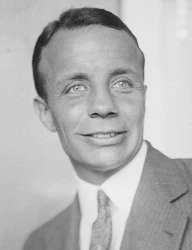Theodore was born in Newhaven Barracks in 1887. His father, future President Theodore Roosevelt was a serving army officer at the time and Ned, as he became known, was largely brought up by his mother and an array of nannies. However in 1891, his father left the army, turning his eye to business. This gave him more time to spend with Ned, Theodore Jr would often call the years 1891-1900 "My golden years". But in 1900 his father became Governor of New York, and he saw little of him.
In 1901 Theodore Jr was packed off to boarding school, and remained

Theodore Jr. in 1909
there until 1906. From 1906 to 1911 Roosevelt studied Law and Politics at the University of Ontario. Theodore and his brother Kermit didn't join the army, unlike their brothers Archibald and Quentin, instead Kermit went on a series of expeditions in Africa, whilst Theodore Jr joined the foreign service.
Theodore Jr served in the US embassy in London (1912-1914), but after becoming aware of diplomatic troubles in Europe he returned to the US.
Ted returned home in May 1914, and immediately joined the Pennsylvania Military Institute. After two months of basic training he was given the rank of Lieutenant and given command of a platoon. As soon as war was declared Ted was on one of the first troop ships to Britain.
After several months training Ted led his platoon during the Flemish landings, and the ensuing campaign. He remained on the front (1915-1917) but took part in no offensives. In late 1917 he was promoted to Captain and given command of a 500m stretch of the front.
On November 16, 1917 the French army launched an offensive, and Ted's section of the line was dead in the middle of it. His company suffered 60% casualties, and all officers except Ted were killed, but he held onto his position, and held out under heavy fire for three days. For this action he and all surviving NCO's were awarded the Medal of Honour. Ted was offered the rank of Colonel, but declined in favour of being a Major.
Ted joined the staff of General Pershing, as the Presidents special representative at the front. Roosevelt struck up a good friendship with Pershing. In March 1918 Ted was accompanying Pershing on a routine inspection of the front, when a shell landed nearby, killing three. Ted was wounded in the leg, and sent home.
Upon his return Ted became his fathers Aid-de-Camp, and remained so until the end of his presidency. In January 1919 Ted was promoted to Colonel, and in December 1920 he was given the theoretical rank of Brigadier General.
After his father's retirement Ted left the army, instead becoming Under Secretary of the Army. Ted held this position until 1926 when he became Secretary of the Army. He served in this capacity for just over a year, until he was elevated to the position of secretary of state. However, Ted's term in this capacity was marred by scandal and he announced that he would resign in January 1929.
He ran as Governor of New York in January 1930 and defeated incumbent Al Smith. He was subsequently re-elected in 1932 and 1934.

